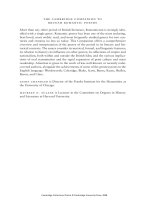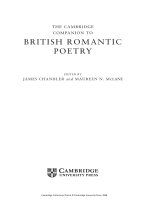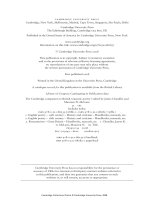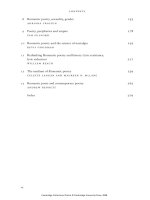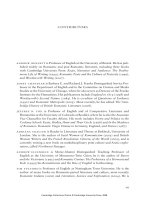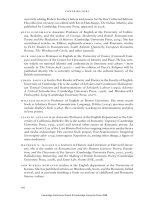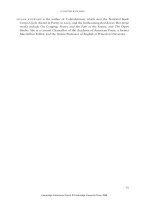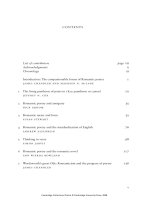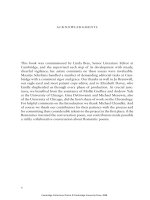The cambridge companion to british roman 255
Bạn đang xem bản rút gọn của tài liệu. Xem và tải ngay bản đầy đủ của tài liệu tại đây (37.98 KB, 1 trang )
Rethinking Romantic poetry and history
resisting the poet’s life history, at a moment when he is about to narrate his
wanderings “among / The unfenced regions of society” (Book VII, ll. 61–2).
For an instructive contrast to this instance of lyric resistance within
Wordsworth’s autobiographical epic, consider the following passage from
Keats’s anti-Wordsworthian epic fragment, Hyperion. The narrative context
is inescapably historical and political: Saturn and the other Titans gathered
around him are lamenting their anticipated fall – the giving way of one ruling order to a new emergent power. The sea goddess Clymene tells how her
effort to deflect the misery with “melody” produced by blowing through a
shell provokes a musical response from Apollo, the new Sun-god of music
and poetry:
from a bowery strand
Just opposite, an island of the sea,
There came enchantment with the shifting wind,
That did both drown and keep alive my ears.
I threw my shell away upon the sand,
And a wave fill’d it, as my sense was fill’d
With that new blissful golden melody.
A living death was in each gush of sounds,
Each family of rapturous hurried notes,
That fell, one after one, yet all at once,
Like pearl beads dropping sudden from their string:
And then another, then another strain,
Each like a dove leaving its olive perch,
With music wing’d instead of silent plumes,
To hover round my head, and make me sick
Of joy and grief at once.
(Book II, ll. 274–89)
In the odes, Keats interrupts immersions in lyric intensity with the claims of
historical temporality and struggling mortality. Here, the mythically allegorized narrative of historical and cultural change is interrupted by a represented experience of lyric that absorbs into itself and places in momentary
suspension the anxieties of anticipated loss. The notes of Apollo’s music
come to Clymene both inside and outside time – “one after one, yet all
at once”; they are experienced simultaneously as the breaking of previously
constructed sequence (“Like pearl beads dropping sudden from their string”)
and as a hovering duration that is the fleeting dialectical resolution of determined sequence and free indeterminacy. Clymene is momentarily suspended
between her resistance to loss and her joy in irresistibly seductive beauty. It
is when her resistance eventually asserts itself most strongly – “Grief overcame, / And I was stopping up my frantic ears” (Book II, ll. 289–90) – that
233
Cambridge Collections Online © Cambridge University Press, 2008
